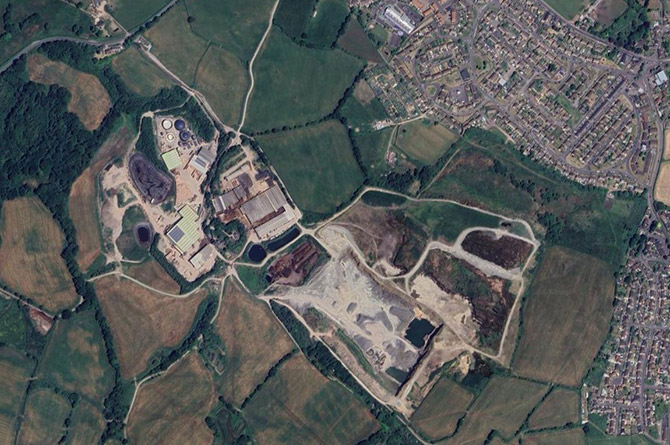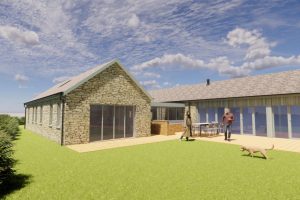CONCERNS over plans to extend a quarry near Gelligaer have been raised in Cardiff Bay, as the Senedd debated calls for a mandatory 1,000-metre buffer zone around all quarries.
Caerphilly’s Labour MS Hefin David highlighted Gelliargwellt Uchaf Farm, which was approved for expansion by Caerphilly Council earlier this year, despite objections from people living nearby.
Dr David said monitoring showed low levels of dust, but it remains a nuisance as do the blasts.
He told the Senedd: “When blasts happen, residents’ windows shake. It can be quite a shock, and we have very little warning as to when these blasts are occurring.”
The Labour backbencher called for planning guidance, known as MTAN 1, which has not been updated since it was introduced 21 years ago, to be reviewed.

Delyth Jewell, who represents South Wales East, warned the quarry is a constant worry for people in Gelligaer and Penybryn. “These residents are choking with the dust,” she said.
“We have to see change. And most of all… we need a system that empowers local residents, not silencing them, I’m afraid, as is happening at the moment.”
Ms Jewell, who is the deputy leader of Plaid Cymru in the Senedd, said people worry about structural damage, their insurance being affected, and homes being devalued.
“But most of all they are worried about their children,” she said. “One resident has written to me talking about how the machinery and noise have woken her sleeping baby, how she has to keep doors and windows closed in hot weather because of an ugly cliff face of pure dust.”

Labour’s Carolyn Thomas led the Senedd debate on an 11,473-name petition – submitted by Monika Golebiewska – calling for an exclusion zone around homes, schools and hospitals.
However, the petitioners’ pleas continued to fall on deaf ears.
Ms Thomas, who chairs the petitions committee which met campaigners in November, urged Welsh ministers to show they are listening to those profoundly affected by quarrying.
“These are people’s lives…,” she stressed. “It is the safety of children on the way to and from school, with quarry lorries going past … the worry about airborne dust in communities, with high rates of serious respiratory conditions… the fear about structural damage to homes.
“And it’s the shock people experience when blasting takes place. It’s hard to watch a video of vulnerable children being terrified by blasting.”

Joel James backed a buffer zone, calling for more to be done to mitigate the impact of Craig-yr-Hesg quarry on people living in Glyncoch, near Pontypridd.
But the Tory cautioned of the importance of quarrying to Wales, with 2,500 employed in a sector which provides more than £170m to the economy.
“It is important we do not lose these jobs but it is equally important communities do not have to live at the mercy of quarrying… which can have substantial negative impacts,” he said.
Rhys ab Owen, an independent, put the current 200-metre buffer zone in context.
“200m is from the Senedd steps to the Norwegian church,” he said, asking: “Who here would think it’d be appropriate to have such noise and such pollution so near to our national legislature, let alone so near to where children live, are educated and play?”

He said the blasting at Craig-yr-Hesg is only 134m from Cefn Primary School and 109m from Glyncoch rugby club, “so, clearly, the current buffer zone is not enough”.
Heledd Fychan, who also represents South Wales Central, called for an explanation of why the 200m zone was not adhered to with expansion of the quarry.
Ms Fychan, who has campaigned against Craig-yr-Hesg, raised the plight of people in the quarry’s shadow, who have described life nearby as a slow Aberfan disaster.
The Plaid Cymru politician told the Senedd: “I think it is scandalous what is happening to the community of Glyncoch…. It is scandalous that their concerns are dismissed.”
Responding to the June 4 debate for the Welsh Government, Rebecca Evans described introducing a 1,000m buffer for new and existing quarries as a blunt tool.
Wales’ economy secretary said the contribution of the minerals industry is often overlooked, with the sector playing a crucial part in infrastructure such as housing, schools and hospitals.

Ms Evans stressed that she would not comment on specific sites to avoid prejudicing potential planning appeals which could land on her desk for a decision in future.
“We don’t agree that a blanket 1,000m buffer zone on new and existing quarries would be appropriate or effective,” she said, arguing decisions are best made locally.
She stated MTAN 1 is clear that the potential impact on health must always be considered but she told Senedd Members: “We do keep things constantly under review.”















